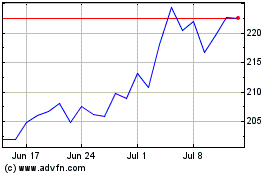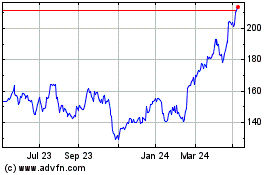Barclays Overhaul Nears End -- WSJ
February 24 2017 - 3:03AM
Dow Jones News
Bank swings to profit, but shares decline; next step is to focus
on technology, costs
By Max Colchester
LONDON -- Barclays PLC Chief Executive Jes Staley on Thursday
said a deep restructuring at the bank would soon finish, as the
British lender swung to a GBP1.6 billion ($1.99 billion) annual net
profit.
Last year, Mr. Staley launched a sweeping overhaul aimed at
refocusing the bank on its U.K. and U.S. businesses. Barclays will
shut the unit that holds its unwanted assets by June, ahead of
schedule, and will also end a hiring freeze.
"We will have completed the restructuring of Barclays at that
point," Mr. Staley said. The British bank will now focus on
revamping its technology operations to reduce costs and improve
customer service. Shares fell 4% in afternoon trading, as the bank
missed analysts' cost targets and investors fretted about future
profitability.
The U.S.-born executive, who spent three decades at J.P. Morgan
& Chase Co., advocates a strategy that was drummed into him at
his alma mater: being a bank with activities stretching from
mortgages to merger advice pays dividends.
The decision to maintain Barclays's investment bank, at the
expense of activities in Africa and Asia, helped push the lender to
a profit last year, compared with a GBP394 million loss in 2015.
Barclays said revenue was down 3% over the year to GBP21.5 billion,
as the bank continued to exit businesses. A fall in fines over its
conduct was partially offset by higher costs as the bank
accelerated a payout of deferred bonuses.
Investment banks across the U.S. have benefited from market
volatility caused by the election of U.S. President Donald Trump,
the U.K.'s vote to the leave the European Union and the prospect of
rising interest rates. Barclays benefited from this lift, with
corporate and investment bank revenue up 6% to GBP10.5 billion,
driven by bond trading and favorable exchange rates. "I would
challenge the notion that only U.S. banks gained share in 2016,"
said Mr. Staley.
Mr. Staley added that the bank didn't have any plans to refocus
more of the business on the U.S. to benefit from any potential
loosening of financial regulations by the Trump administration. "We
are managing the business under the assumption that Dodd Frank will
stay," Mr. Staley said. "So we are not changing our strategy as we
look forward."
Barclays said it was on track to deconsolidate its African
business from its accounts. It has agreed on a GBP765 million
separation agreement with its African business, which must now be
approved by South African regulators. Once the "noncore" unit is
closed, the amount of unwanted assets folded back into the bank
will be GBP25 billion, slightly larger than what analysts had
expected.
However, while the bank has made progress, analysts said not all
hurdles had been cleared. The bank posted a return on equity -- a
key measure of profitability -- at 3.6%, well below its targeted
returns.
Dividend increases remain over the horizon after shareholder
payouts were slashed to fund the accelerated turnaround at the
bank. A series of litigation issues are also hanging over the bank.
Barclays is being sued in the U.S. by the Justice Department for
its alleged role in the sales of toxic mortgage-backed securities.
It is also being probed by U.S. and U.K. authorities over how it
wooed Middle Eastern investors to pump cash into the bank at the
height of the financial crisis.
To try to reshape the bank's technology systems Mr. Staley has
replaced a number of key executives. Barclays has brought in new
technology, data and risk officers. He also poached Paul Compton
from J.P. Morgan to act as Barclays's chief operating officer.
Write to Max Colchester at max.colchester@wsj.com
(END) Dow Jones Newswires
February 24, 2017 02:48 ET (07:48 GMT)
Copyright (c) 2017 Dow Jones & Company, Inc.
Barclays (LSE:BARC)
Historical Stock Chart
From Mar 2024 to Apr 2024

Barclays (LSE:BARC)
Historical Stock Chart
From Apr 2023 to Apr 2024
